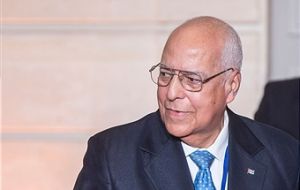MercoPress. South Atlantic News Agency
Castro condemns “obsolete mentality” against foreign capital, as economy contracts
 Economy Minister Ricardo Cabrisas and President Raul Castro told Parliament that Cuba's GDP fell nearly 1%, after a steady growth of 3% in the last five years.
Economy Minister Ricardo Cabrisas and President Raul Castro told Parliament that Cuba's GDP fell nearly 1%, after a steady growth of 3% in the last five years. In spite the significant surge in tourism set off by the detente with the United States, Cuba’s economy shrank in 2016 for the first time in nearly a quarter century with the main culprit: a plunge in aid from crisis-stricken Venezuela. President Raul Castro called on the Cuban people to overcome the obsolete mentality against foreign capital.
Economy Minister Ricardo Cabrisas and President Raul Castro told Parliament that the island's gross domestic product fell nearly 1%, after showing a steady growth of 3% over the last five years.
Cabrisas blamed the slump on Venezuela's troubles and a decrease in revenue from Cuba's few exports, which include sugar, refined gasoline and nickel, whose price has dropped in recent years.
The last time official figures showed a fall in Cuba's GDP was in 1993 after the Soviet Union collapsed, abruptly stripping away much of the island's aid and trade.
A global drop in petroleum prices has slammed Venezuela's oil-dependent economy, forcing it to reduce shipments of heavily subsidized crude oil to Cuba, with exports dropping from 115,000 barrels daily in 2008 to 90,000 in recent years to 40,000 in the past few months.
In addition, the number of contracts for Cuban professional services with Venezuela has dwindled and some payments have not been made, Cabrisas said. A large number of Cuban doctors have long traveled to Venezuela, with their salaries going directly to Cuba's government.
“This confirms what we had said about Venezuela's situation leading to a recession,” Cuban economist Pavel Vidal, a professor at a university in Colombia, told The Associated Press.
Cabrisas, whose speech was partially transmitted on public TV, also blamed the economic slump on U.S. sanctions on Cuba, with officials previously saying that the 55-year-old embargo has cost the island US$125.9 billion, including US$4.6 billion last year.
Tourism, however, has been thriving since U.S. President Barack Obama ordered the restoration of diplomatic relations between Washington and Havana two years ago. Overall visitor numbers rose more than 15% in 2015 and again this year.
In his speech, Castro appealed to a combination of foreign capital investment and austerity to bring about the 2% economic growth forecast by the government for 2017. He also urged the nation to overcome the “obsolete mentality, full of prejudices” against foreign capital and to “overturn false fears” against foreign investment.




Top Comments
Disclaimer & comment rules-

-

-

Read all comments“obsolete mentality against foreign capital....”
Jan 02nd, 2017 - 02:19 pm +3If Cuba can figure that out, how long will it be before reekie sees the light?
I like it, Venezuela sends cheap oil to Cuba and then Cuba refines it and sells it on, probably back to Venezuela at a profit. Love these socialist paradises.
Jan 02nd, 2017 - 03:36 pm +2No, VZ oil was not free for Cuba. Cuba supplied “teachers and doctors” to VZ as part of Maduro's “revolution,” but the teachers were really propagandists and the texts were essentially indoctrination for the great unwashed to promote that revolution.
Jan 02nd, 2017 - 09:38 pm +2“They were previously subsidised by the USSR.”
-- The USSR has been gone for a long time. The loss of cheap energy from the former USSR in 1990 meant that Cuba had to develop greater internal production and that included some interesting but small scale micro-hydro, wind, solar, and biomass projects, and some reduction in use of fossil fuels in agriculture. Though of course they still need petroleum imports. But Cuba has also been exporting alternative energy assistance to other Third World countries.
Contrary to popular belief, Cuba does have a domestic petroleum production industry, of about 45,000 bbls a day, but that's only about half of what their economy uses right now.
Commenting for this story is now closed.
If you have a Facebook account, become a fan and comment on our Facebook Page!